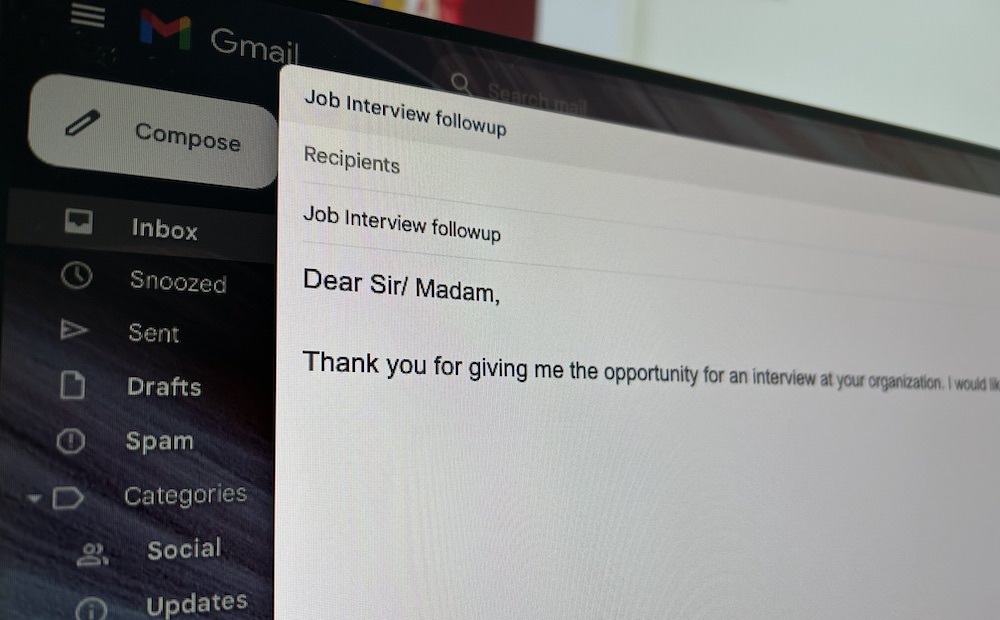
If you’ve invested effort in your CV/resume and are confident in your qualifications, chances are you’ll soon receive calls from your targeted companies for a face-to-face interview. Typically, a candidate is selected for an interview because one of these factors has caught the recruiters’ attention: the right degree or professional background, an impressive portfolio, valuable work experience, or a suitable salary range request.
So, you have at least one good reason that has qualified you for a few minutes with your potential employer. This is a golden opportunity that brings you one step closer to your dream job, and we bet you don’t want to squander it. Are you willing to go the extra mile to ace the interview and secure the job?
.no-js #ref-block-post-9731 .ref-block__thumbnail { background-image: url(“https://assets.hongkiat.com/uploads/thumbs/250×160/ways-to-get-your-resume-noticed.jpg”); }
7 Great Ways to Get Your Resume Noticed
Getting your resume noticed is the first step towards successful employment, and it may lay down the path… Read more
Here’s an insider’s guide on how to land the job, from the interviewer’s perspective.
Before the Interview
A wise man once said, “By failing to prepare, you are preparing to fail.”
Preparation here means getting everything ready – both physically and mentally. Try to familiarize yourself with a brief but comprehensive portfolio that can leave a positive impression on the interviewer. Apart from that, there are other aspects you should consider:
1. What Are You Really Good At?
What are the soft skills and technical expertise that you’ve mastered? Once you’ve identified them, consider what truly sets you apart from others who presumably have the same skills and knowledge. Your unique attributes are your main selling points.
These points give you an advantage and will help convince the interviewer to choose you.
.no-js #ref-block-post-17771 .ref-block__thumbnail { background-image: url(“https://assets.hongkiat.com/uploads/thumbs/250×160/skills-working-on-the-web.jpg”); }
10 Skills You Need to Be Successful Working Online
Freelancers wanting to cut costs and maintain full editorial control will frequently and aggressively invest in honing their… Read more
2. What Have You Achieved?
Yes, you need to clarify what you have accomplished, completed, achieved, contributed, etc. Divide this category into group projects and individual work.


While individual projects may showcase your prowess and proactive side, successful group projects hint at your ability to work in a team. It also shows that you acknowledge the hard work of team members and therefore know how to harness them for large projects. That’s a plus, right there.
3. What Are You Passionate About?
The simplest way to identify genuine passion when it is work-related is to consider what you would most likely do even if you weren’t paid for it. If you have something you are passionate about and it is related to the company and can evoke resonance within the company, we want you.
.no-js #ref-block-post-22071 .ref-block__thumbnail { background-image: url(“https://assets.hongkiat.com/uploads/thumbs/250×160/about-passion.jpg”); }
The Truth About Passion And How It Affects You
Today I’m going against the grain and asking you a question which you may have been wondering yourself… Read more
4. Circumventing Trick Questions
While seemingly innocent, a few of these questions have an ulterior motive – why did you choose this company? Why did you quit your last job? Why do you think you deserve this position? What is your weakness/strength? They all reveal a part of you that interviewers cannot find on paper, so think the answers to these questions through before you answer them.
Also, research the range of your expected salary and confidently inform your interviewer when asked about it. If it is not excessive, and you are a keeper, they will give it to you.
.no-js #ref-block-post-16913 .ref-block__thumbnail { background-image: url(“https://assets.hongkiat.com/uploads/thumbs/250×160/interview-weird-questions.jpg”); }
Weird Questions Asked During A Job Interview
Ever heard of horror stories where the candidate is asked a totally unrelated question out of the blue… Read more
5. Do a Background Check
“Know your enemy and know yourself and you can fight a hundred battles without disaster.” – Sun Tzu. Of course, the company is not your enemy, but it is always a must to understand the company as much as possible before you go for an interview.


Understanding a company can start from the company’s business nature, the person-in-charge (CEO/founder), its vision, mission, culture, target customers, etc.
Bonus Tip: Suggest New Ideas
You may also want to prepare 2 to 3 constructive suggestions for the company, such as marketing strategies or product feedback. Two or three is a good number since zero means you didn’t prepare at all, and more than 3 means you’re overselling yourself and it may offend the interviewer if they are not really open-minded.
How to Ace the Interview
Prepared for the interview? Here are nine more tips to take note of:
1. Maintain a Positive Attitude
We all love cheerful and friendly people, don’t we? Smiling is a simple yet powerful gesture that can set the tone for the entire interview. It brings the positive energy within yourself to the interviewer and it simply cheers up the atmosphere. A positive attitude can make you more approachable and likable, which can be a significant advantage in an interview setting.
2. Master the Art of Greeting
The first impression matters a lot, and it starts with a proper greeting. Stand up (if you’re sitting) as the interviewer enters the room. Greet the interviewer with a firm handshake. This simple act of courtesy can set a positive tone for the rest of the interview.


3. Show Humility
Most interviewers can easily judge your capabilities via conversation. Be humble when you introduce yourself and be ready to admit that you don’t know “everything”. This shows your willingness to learn and grow, which is a trait that many employers value.
4. Pay Attention
If an interviewer starts talking or asking questions, pay attention and listen intently. Your body language is important: don’t lean back, sit properly; don’t cross your arms; don’t fidget; don’t play with the pen or click it mindlessly – it’s distracting. Showing that you’re fully engaged in the conversation can leave a positive impression on the interviewer.
5. Be Proactive
Take cues from the interviewer’s body language too. If they look like they’ve lost you somewhere, ask if there is a problem before continuing. Being proactive shows that you’re not only attentive but also eager to ensure clear and effective communication.
6. Confidence, Not Arrogance
It’s important to be confident, but not arrogant. Don’t oversell yourself. Bear in mind that interviewers usually are more experienced than you if not in the industry, then in the nature of the company.
Plus, they’ve probably met good, bad and ‘uglier’ copies of you long before you finished middle school. Confidence shows that you believe in your abilities, while arrogance can be a turn-off.


7. Share Your Opinions
If you’re asked, you can also share your opinions about the future trends of the company’s products or marketing strategies. This can easily impress an interviewer but only if you are well-prepared. It shows that you’ve done your homework and are genuinely interested in the company.


8. Avoid Negative Talk
Under no circumstances should you complain about past supervisors or companies you have worked with, even when the interviewer themselves do so. If you would complain about your past employers, you would complain about future ones too. Keeping the conversation positive and professional is key to leaving a good impression.
9. Follow Up
Send a thank you email on the same day and also mention the reasons you think you fit the position. If you don’t get a reply, try again after 3 to 5 working days. Every employer appreciates the ‘never give up’ spirit. If it’s about your dream job, don’t compromise. Following up shows your enthusiasm and commitment, which can set you apart from other candidates.


Wrap Up
We believe daily improvements are actually much more important than the guidelines above. After all, the success rate also depends on your qualifications for a particular position and a reasonable expected salary.
Take each interview seriously and we hope the tips in this post will help you leave a great impression on the interviewers, and more importantly, get you the job.
The post How to Ace Your Interviews (From the Interviewer’s POV) appeared first on Hongkiat.